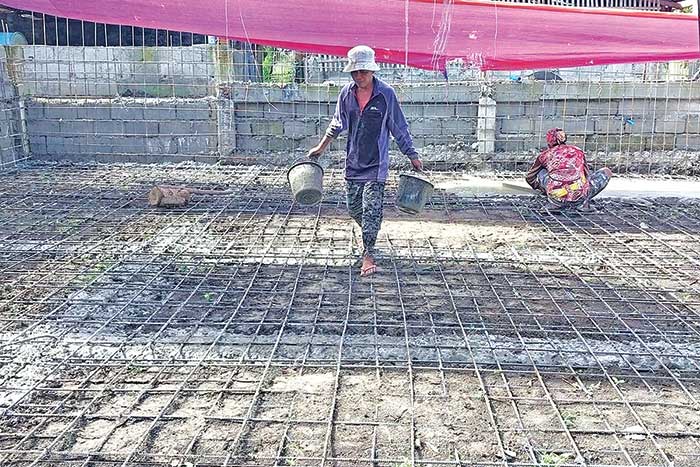
By Francis Allan L. Angelo
A significant overhaul of the Philippines’ minimum wage structure is proposed to replace the current 17 regional wage boards with a more manageable six clusters, a move that aims to narrow the wage and poverty gaps across the country.
The current system, characterized by its complex and multilayered regional wage rates, has been criticized for complicating the wage system and conflicting with the principles of the Ease of Doing Business Law.
Representative Joel R. Chua, (3rd District of Manila) proposed the clustering to reflect an understanding of the considerable progress that has been made in the economy of various regions since the inception of the current wage structure, which is viewed as outdated and reminiscent of the 1950s economic landscape.
Clustering the wage boards by grouping regions with similar minimum wage levels aims to streamline the system, reducing administrative burdens and potentially increasing compliance.
Under Chua’s proposed structure, each cluster would have a single minimum wage rate, ensuring a fairer and more uniform wage landscape across the nation.
In-depth studies of the minimum wage levels across regions have indicated that a shift to clustering, regulated by a new minimum wage law, is necessary.
This shift would not only be a move away from regional to cluster-based wage setting but would also address the disparities that have long been a point of contention, particularly where minimum wages fall below the poverty threshold.
The proposition also suggests the elimination of distinctions between different localities and types of jobs within each cluster, advocating for one minimum wage rate per cluster of regions.
This could represent a step toward greater equity in wage distribution, a move that could ultimately lift workers across various sectors above the poverty line.
The current 2024 minimum wage rates and ranges, and the proposed clustering solution:
CLUSTER 1
- NCR: P573.00 – P610.00
- CALABARZON: P385.00 – P520.00
- Central Luzon: P385.00 – P500
CLUSTER 2
- Region 1: P402.00 – P435.00
- Region 2: P430.00 – P450.00 (come April)
- CAR: P430.00
CLUSTER 3
- Western Visayas: P440.00 to P480.00
- Central Visayas: P415.00 to P468.00
CLUSTER 4
- Northern Min (R10): P411.00 – P438
- Davao Region (R11) P476.00 – P481.00 (by September 2024)
CLUSTER 5
- Bicol: P395.00
- MIMAROPA: P369.00 – P395.00
- Eastern Visayas: P375.00 – P405.00
CLUSTER 6
- BARMM: P316.00 – P361.00
- Zamboanga: P368.00 – P381.00
- CARAGA: P385.00
- Region 12: P382.00 – P403
The proposed changes advocate for a minimum wage that not only meets but exceeds the poverty threshold, signaling a push towards a more equitable economic structure for all working Filipinos.
This approach towards wage regulation is seen as not just a simplification of the wage system but also as a step towards economic fairness and market safety. By fostering a level playing field, consumer confidence and investor trust are likely to improve, thus boosting the overall economy.
While the proposition is promising, it also raises questions about its implementation and impact on different economic sectors and regions. Balancing the needs of businesses with the welfare of workers will be crucial in this transition.
WELCOME MOVE
Labor group Partido Manggagawa (PM) welcomed moves to replace the current wage regionalization scheme with a wage clustering system.
PM-Iloilo spokesperson Mario Andon said the proposal is founded on a recognition of the failures of the existing wage fixing system and thus opens a window for a discussion of a better mechanism.
“We agree that wage regionalization has led to a huge gap between wages of regions that are not substantiated by differences in cost of living, and also has led to complexity in implementation as workers and the DOLE (Department of Labor and Employment) has to monitor almost 50 minimum wages across the country,” Andon said.
On those very same bases, PM pushed for a national minimum wage as a floor.
“Differences between actual wages should be based on seniority, skills and productivity. Also, while we insist that a replacement to the wage regionalization mechanism is also overdue, let us not lose sight of the immediate demand for a P150 across-the-board legislated wage recovery,” Andon said.
PMp primarily demanded the following:
- Php 150 across the board wage increase to recover wage loss due to inflation (immediate);
- Non-wage benefits to enhance take home pay (for example: suspension of Philhealth contributions, etc,);
- Review and amend RA 6727 with the end in view of having uniform wage rates and satisfying the constitutional mandate of granting workers a living wage;
- Enhance wage and benefits setting through collective bargaining negotiations by implementing ILO-HLTM recommendations so that workers can exercise freedom of association that is free from harassment and intimidations, and unwarranted regulations.




















